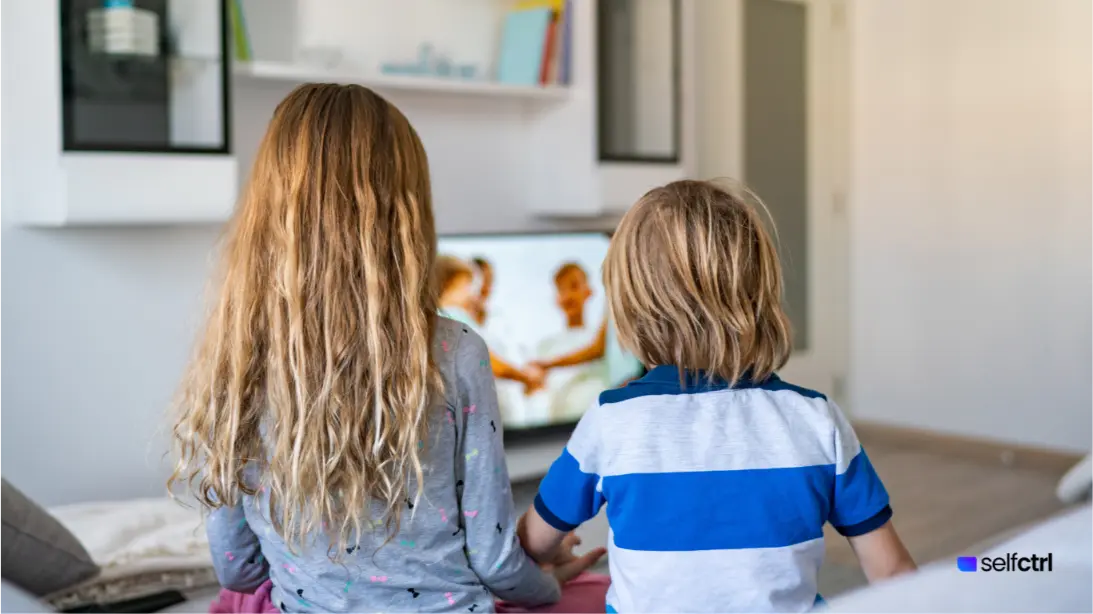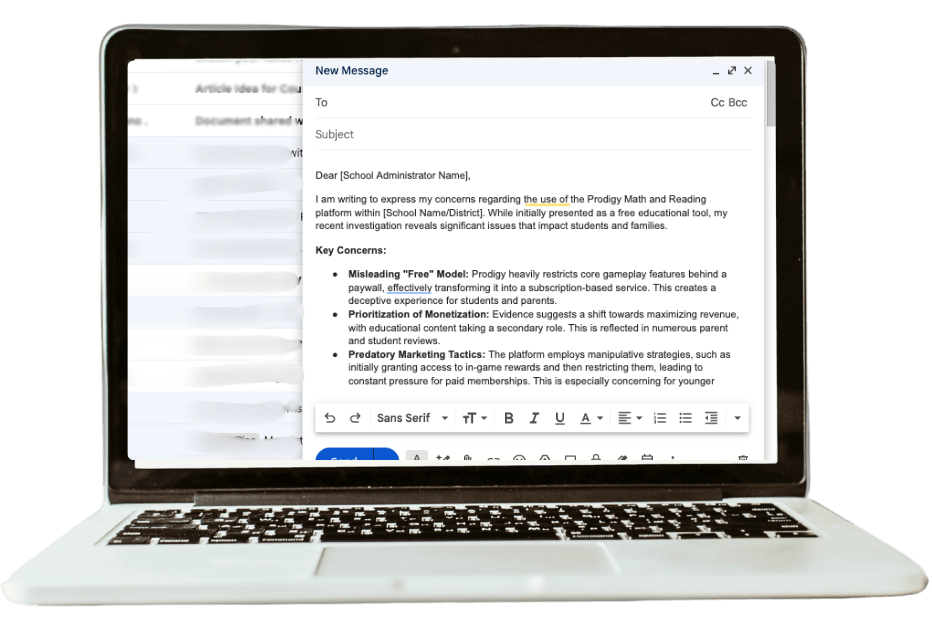For many parents, a new school year means a new form of chaos. Busy schedules, homework help, extracurricular activities, and endless carpooling flood our daily reality. It’s challenging to think about how healthy screen time habits fit into all of this.
Even so, a new school year also allows parents and kids to reassess their family routines, offering a fresh start and an opportunity to reset from habits that no longer serve them well.
In envisioning what our school days will look like, one of the biggest challenges parents face is finding more peace in their family’s morning routines.
Mornings set the tone for the day. How we handle tech in those first moments out of bed matters for the whole family. Exposure to screens too early in the day can set both parents and kids on an unhealthy trajectory.
Why go screen-free in the morning?
Recently, I experienced the adverse effects of consuming technology too early in my day. I was getting ready to journal just after the kids left for school, like I always do. I had my Bible and journal in hand as well as my phone, affording me a little online exploration of the morning’s text.
While some mornings I manage to utilize my phone solely for the purpose I intended, this morning was not one of those. The curiosity of the day’s notifications got the best of me, and I grabbed for the phone first.
Now I was fixating on a post involving a group of fellow moms enjoying a concert with their husbands and teenage daughters. I could have just been happy for them. Instead, I began asking myself all the self-condemning questions:
Why haven’t I planned a fun outing like this with my family yet?
Will our growing kids continue to feel bonded to us if I haven’t belted out the words to a Lumineers song with them in an open-air concert venue?
Can I even name a Lumineers song?
No more than fifteen minutes had passed since I’d opened Instagram. Yet the trajectory of my internal thoughts had been severely altered. Even after the app was closed, I could feel its effects on my brain—the dopamine had hit. My brain felt like it was moving faster than usual; my thoughts scattered.
There was nothing innately wrong with my Instagram friend’s post; this was an issue of my own choices. Google reminds us, “Early morning screen use can trigger the body’s fight-or-flight response, leading to stress and a heightened state of alertness.” This heightened state can lead to anxiety and cause us to be more reactive than proactive throughout the day.
What screen use before school does to our kids
If this is what starting my day with social media and screen time does to me, what does it do to our kids? The information overload and overstimulation of screens before a school day negatively impact our kids’ internal peace, academic success, and social skills.
First, studies show that kids who avoid screens before school show better academic performance than those whose morning routines include them. Because screens impact our ability to focus, concentrate, and exercise creativity, students who’ve had exposure to them before the morning bell experience a compromised learning environment.
Breaking Busy author, Alli Worthington says it this way: “That dopamine hit rewires your brain to chase noise. All day. And your focus? Gone. Evaporated.”
I certainly felt this. My detour on social media disrupted my normal thought pattern. I felt anxious and out of rhythm, as my mind raced from thought to thought, mimicking the rhythm and pace of the scroll.
Like many experts, Worthington suggests no phone for the first thirty minutes of your day. Even on non-school days, there are multiple benefits to screen-free mornings. Your own childhood likely included Saturday morning cartoons, giving your parents a chance to sleep in. (Can you blame them?)
But even on weekends, screen use early in the day can lead to problems later. Pulling kids away from their screens when their brain chemistry has adapted to overstimulating input often leads to outbursts that seem unwarranted for the situation. Countless parents report excessive crankiness from their kids for hours after pulling them from screens.
So, how can families go screen-free in the mornings?
Below are five ideas for screen-free mornings with kids:
Buzzzzz…time to wake up
Make sure your kids’ alarm clock is separate from their phone. Research shows that people who use their phones as their alarm clocks are more likely to experience a host of unwelcome health outcomes, including increased stress levels and blood pressure. My kids each have a mini HomePod in their rooms to play music and to serve as their alarm clock.
Once your kids are out of bed, encourage early-morning alternatives to the blue light from screens. Worthington suggests opening a blind to let in more daylight as soon as possible in your day. Scientifically, natural light helps jump-start your day a lot better than blue light can.
Location is key
Design a family charging station to place all of your phones at the end of the night. Consider including a lock box for those who are still working on developing skills in self-control and a charging block that charges several devices at once. Place the family charging station on the main level, away from bedrooms or in your room away from your own bed, too.
Make mornings meaningful
If your nights are full of homework and extracurriculars, mornings can be a way to center your family on what’s most important. What are your family’s values? Based on your answer, challenge yourself and your family members to start the day with a gratitude practice, with prayer, or with simple self-care techniques.
Author Justin Whitmel Earley, in his book Habits of the Household, boils all of parenting down to this one thing: “stewarding moments.” We may not find a lot of extra time in our mornings, but we can carve out time, little by little. We can work with the rhythms we already have in place and change them ever so slightly to steward the moment toward meaning.
What does your family’s morning routine look like? It probably involves kids taking turns using the shower, running up the stairs for forgotten socks, grabbing coats, looking for computers, and popping pastries out of the toaster to eat while scuffling to the bus stop.
In all this, I’ve managed to read a short devotional to my kids and pray with them before they get on the bus. They may not have caught every word, but they are learning that centering their souls on God is an important daily practice.
The older my kids get, the more I transfer leadership in this area to them. Still, they’re often tempted to fill any margin in their morning with texting, social media, or finishing the episode they started the night before. So, to get kids and teens to prioritize connection or intentional time alone to prepare their hearts and minds for the day, they need help developing healthy parameters for their tech.
Create a routine
Clearly defined routines help us avoid arguments related to screen time. My youngest daughter is highly sensitive and thrives on a routine. We bought these white erase chore charts, ideal for helping younger kids visualize their morning and evening routines. Kids can outline tasks for getting ready for school or for bed. Older kids can make their own visual organization systems at the beginning of the school year. A more peaceful environment for all is the intrinsic incentive for sticking to it.
Older kids who have cell phones often want to check in with their friends or classmates before they get to school to discuss upcoming homework, wardrobe choices, or after-school plans. You can schedule the last five minutes of their morning routine for a digital check-in with friends. This time is contingent upon all their other responsibilities being done.
Parental controls
Most phone companies now offer extensive parental control settings to help reduce fighting over technology. For example, in Apple’s parental controls, you can set individual apps not to “wake up” until a specific time. You can also set a screen limit for the entire phone. Essentially, the phone will have minimal capabilities until a particular time of day that you preset. (You can also tell the phone when to turn off different apps and capabilities at the end of the day.)
Set an example
I realized the hard way that screens hijack my morning peace. Alternatively, by creating a screen-free routine, we give our kids (and ourselves) a calmer, more intentional start to the day. Screen-free mornings help our kids arrive at school with minds ready to learn.
As parents, we likely aren’t utilizing chore charts or parental controls to regulate our own screen use throughout the day. However, whenever we challenge our kids with a new way of doing something, we should model it ourselves. Ask yourself: What’s keeping me from making my mornings screen-free?
The truth is, small, consistent changes add up. Whether it’s a gratitude practice at breakfast, a quick prayer before heading out the door, or simply letting in the morning light instead of blue light from a screen, you’re helping your family start each day grounded and ready.

Written by: Jenna Kruse
As a speaker, writer, and mom of three, Jenna Kruse helps parents with school-aged kids overcome the frustration, fatigue, and hopelessness of parenting in the digital age so they can enjoy their kids and thrive in their role of raising the next generation to know and love Jesus. Alongside her husband, Jenna has worked with teens for over twenty years in the public school setting, the non-profit sector, and the church.




